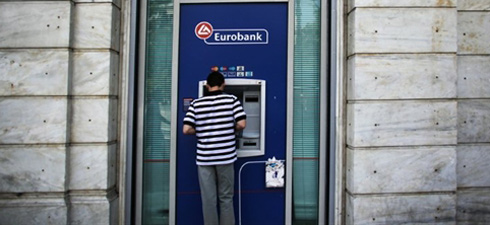91 banks tested, 84 approved. The results of the stress tests conducted by national and European banking authorities on 23 July, paint a portrait of a stable and healthy European banking system.
"Everyone was surprised by the banks' positive test results", declares the assistant director of El Mundo, Casimiro García Abadillo, surprised to learn that the tests revealed a need for financing of "only 3.5 billion euros!". However, in spite of the satisfaction shown by the European Central Bank, the European Commission and the various governments of the EU, the operation does not seem to have reassured observers.
How bankers inflate their morale
"European countries have obtained the opposite of what they wanted", notes De Volkskrant. "Instead of generating confidence and calm, the tests have provoked mistrust and even more stress in the European financial sector. As long as there is no unanimous consensus on the quality of the test, there will be no certainty as to the stability of European banks. Across the Atlantic, this has made the Americans smile".
"Tests without stress, or how bankers inflate their morale", Gazeta Wyborcza ironically observes, speaking of the tests as nothing but a "propaganda victory". The Warsaw daily considers that the test criteria used (lowering Greece's euro obligations by only 20%, with a forecasted drop of 20% in the stock market indices) were unrealistic, and that it was clear that European banking supervisors fixed the conditions so as "to do no harm to European banks". If they were hoping that investors would swallow the bait and begin to buy shares in banks, they are wrong: this is not the way to enhance banks' credibility. "Worse yet", warns the paper, "certain investors might think that if European officials have put so much effort into organising this show, then there must be some nasty skeletons in the closets of European banks".
Patchwork fixes
In the Financial Times, Wolfgang Münchau is even more severe. "The purpose of this cynical exercise was to pretend that the EU was solving a problem, when in fact it was not," writes the reporter, who reproaches supervisors for having excluded certain financial institutions from the tests, and above all to have avoided fixing strict criteria. In particular, Münchau, like many commentators, observes that the tests did not sufficiently take into account the realistic hypothesis of a payment default of one of the member states.
"The stress tests follow a pattern that has been evident since the outbreak of the acute phase of the financial crisis in September 2008,” adds the FT journalist. "The EU’s approach to the financial sector has been to apply patchwork fixes – a blanket bail-out, some not very serious recapitalisation plans, plus loads of liquidity – rather than solve the problem. while in Madrid the stress tests are part of a political commitment to resolve the banking problems, that is not the case elsewhere. A stress test without a resolution strategy – which is what is absent beyond Spain – is entirely pointless.” In fact, Casimiro García Abadillo comments in El Mundo that "In this scenario of positive sincerity, the Bank of Spain has enlarged the scope of the strip-tease demanded by the governments of different countries, while the BCE has only asked for a topless show".
Raising as many questions as answers
If banking authorities have themselves experienced stress, this is because the "chief European controllers have felt imposed upon by political interests to create a test of limited value that was not really wanted in the first place", states Handelsblatt. The German economic daily observes that only individual, targeted verifications on a particular bank could paint a clear picture of its capacity to face risks. At any rate, German banks have been monitored in this manner for a long time. Which leads to a note of hope from Handelsblatt "that this will remain a unique case and will not become an annual ritual".
At the end of the day, even if "the publication of the stress tests has without a doubt raised as many questions as it provided answers for the markets," La Tribune still recognizes their value. This is because they have furnished investors with extremely detailed information on 91 European banks, notably concerning their weaknesses with respect to different national debts. Thus, affirms the French economic daily, "investors will distinguish between those that have passed the tests with high marks and the others". And from now on, concludes Portugal’s Jornal de Negócios, "the reaction of the markets in the days to come will reveal if the tests have contributed to the trend towards recovery in Europe".
Was this article useful? If so we are delighted!
It is freely available because we believe that the right to free and independent information is essential for democracy. But this right is not guaranteed forever, and independence comes at a cost. We need your support in order to continue publishing independent, multilingual news for all Europeans.
Discover our subscription offers and their exclusive benefits and become a member of our community now!












